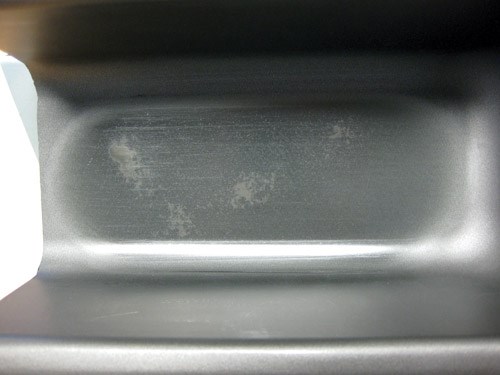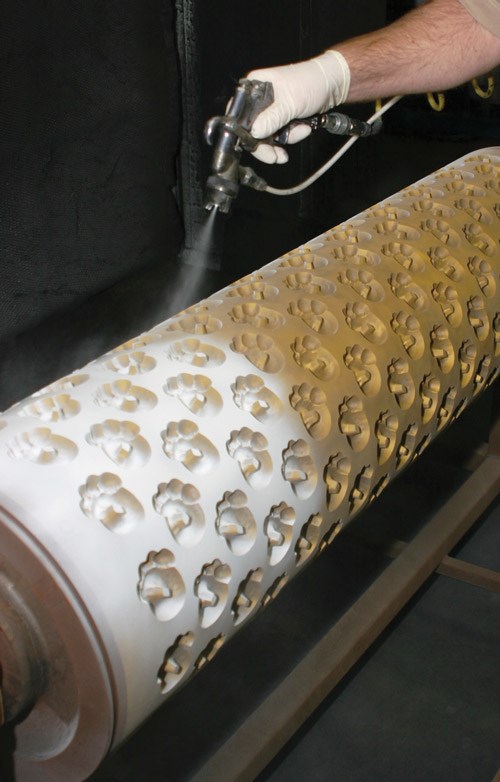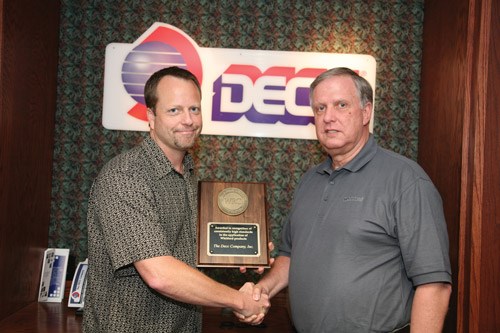When the DECC Co. (Grand Rapids, Mich.) went looking for a commercial-grade coating approved by the Food and Drug Administration to help garner a larger piece of the food processing, cooking and bakeware sector, it got more than it bargained for.
DECC turned to Whitford Corp. (Elverson, Pa.), a company that has a four-decade reputation for its non-stick houseware products and large line of fluoropolymer industrial coatings, including Eclipse, Eterna, Excalibur, Fusion and HALO.
But while DECC took care of its commercial food processing and cookware needs with Whitford’s Eclipse product, the company is also serving some of its more industrial clients with the same non-stick applications.
DECC Sales Manager Randy Schroeder says one of the company’s industrial clients was not getting desired results from a rubber and metal mould until DECC decided to use the Eclipse coating on the material.
“The proof is in the performance,” Schroeder says. “Although we knew it was for food products, its release properties are also great for industrial applications, too. That was very big for us and our clients.”
The DECC Co. serves a variety of industries including automotive, diesel, aerospace, furniture, alternative energy, commercial food processing, medical and military. DECC's capabilities include electrostatic and robotic spray applications, surface preparation, rack coating design and fabrication, as well as assembly and packaging.
Eclipse is a three-coat, internally reinforced nonstick system developed several years ago. The ground coat contains blended resins and unusually hard materials, which the company says permit a far higher percentage of special reinforcing elements. The midcoat, which is a primer used in other Whitford reinforced systems, also contains the special reinforcing elements. The topcoat is rich in fluoropolymers, and is dedicated entirely to release, which gives it the nonstick characteristic.
Schroeder says the Eclipse brand puts out good numbers in Whitford’s ‘Reciprocating Abrasion Test,’ which the company says is demanding because it duplicates the harshest conditions to which a pan can be subjected in the kitchen: scouring with a Scotch-Brite pad.
Whitford stops the test every 10,000 cycles and performs what it calls the ‘Dry-Egg Test’ to see if a fried egg sticks to the pan with no additional release coating added.
Here’s how it works: A fresh raw egg is carefully broken into the center of a nonstick pan preheated to 350°F, and cooked for 2.5 minutes. Then a spatula is inserted under one edge of the egg, and the effort to lift the egg is rated on a scale of 5 - 1 (5 = easy to remove, 1 = sticks to the pan). The test is repeated until the eggs no longer lift off with ease, at which point the nonstick is considered to have begun to wear off.
The company says that most internally reinforced coatings reached 20,000 cycles before showing signs that the egg was sticking.
Schroeder says the data provided by Whitford shows the first version of Eclipse went beyond 200,000 cycles, or 10 times the usual durability. Newer Eclipse data shows the test now exceeds 700,000 cycles while retaining its release effectiveness.
And as long as the substrate can handle a 700° bake cycle, the coating will work on virtually any substrate.
“Although this coating system has only been available for a short amount of time in relation to other coatings on the market, it is proven to be one of the best in the industry,” Schroeder says. “As we work toward being a first option for potential customers when a quality, commercial grade FDA approved coating application is needed, we believe the Eclipse system makes the choice that much easier. It also helps that we are now one of only about 20 companies in the world that apply this coating system.”
Not only is DECC on the short list of Eclipse coaters, they are on Whitford’s short list of recognized premier applicators in regards to the quality application of all their products, as well. Recently awarded a plaque for maintaining consistently high standards in the application of Whitford products, DECC was one of only 25 coating applicators to receive the honor.
Whitford bills itself as the “makers of the world's largest, most complete line of fluoropolymer coatings,” which are high-performance plastic materials used in extremely harsh chemical and high-temperature applications, such as in defense, automotive, aerospace, electronics and telecommunications industries.
Several years ago fluoropolymer coatings came under fire from environmental groups who claimed that perfluorooctanoic acid (PFOA) used to manufacture the coatings was turning up in blood samples in people, and also in some wildlife.
That prompted the U.S. Environmental Protection Agency to investigate the use of PFOA in fluoropolymer coatings, but it found no danger in the product being used in cookwares.
“The information that EPA has available does not indicate that the routine use of consumer products poses a concern,” an EPA statement says. “At present, there are no steps that EPA recommends that consumers take to reduce exposures to PFOA.”
Whitford officials say that “what little PFOA may have been in the dispersions used to make the coating is removed by the curing (baking) process through which all nonsticks pass—to the point at which it is undetectable in the toughest migration tests.”
Whitford also manufactures its Xylan industrial powder coatings designed to provide a highly decorative finish to pieces exposed up to 575°F. They come in a wide range of colors and finishes, and pretreatment is a degreasing, zinc phosphating or grit blasting. It has a dry film thickness of 40 - 60 microns, and a curing temperature of 390 - 600°F minimum with options to cure at higher temperatures. Decorative uses include electrical appliances, boilers, stoves, fireplaces and halogen lamps.
Schroeder says using the Whitford Eclipse system will open DECC up to new sectors it didn’t previously have.
“We’ve locked in with this product because it offers our customers the best performance,” he says.
For more information, contact DECC at 616-588-2850, or at DECC.com. Whitford Corp. can be reached at 610-286-3500, or at Whitfordww.com.























